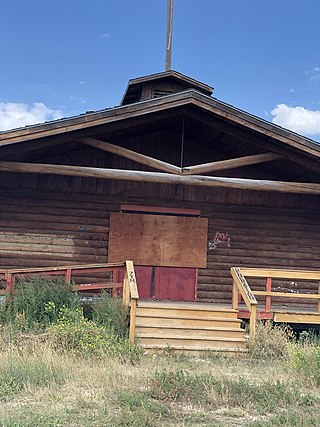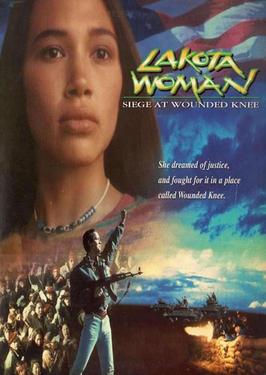
The Ghost Dance is a ceremony incorporated into numerous Native American belief systems. According to the millenarian teachings of the Northern Paiute spiritual leader Wovoka, proper practice of the dance would reunite the living with spirits of the dead, bring the spirits to fight on their behalf, end American Westward expansion, and bring peace, prosperity, and unity to Native American peoples throughout the region.

The American Indian Movement (AIM) is an American Indian grassroots movement which was founded in Minneapolis, Minnesota in July 1968, initially centered in urban areas in order to address systemic issues of poverty, discrimination, and police brutality against American Indians. AIM soon widened its focus from urban issues to many Indigenous Tribal issues that American Indian groups have faced due to settler colonialism in the Americas. These issues have included treaty rights, high rates of unemployment, the lack of American Indian subjects in education, and the preservation of Indigenous cultures.

Dennis Banks was a Native American activist, teacher, and author. He was a longtime leader of the American Indian Movement, which he co-founded in Minneapolis, Minnesota in 1968 to represent urban Indians. He was a pre-eminent spokesman for Native Americans. His protests won government concessions and created national attention and sympathy for the oppression and deplorable endemic social and economic conditions for Native Americans.

Irene Bedard is an American actress, who has played mostly lead Native American roles in a variety of films. She is perhaps best known for the role of Suzy Song in the 1998 film Smoke Signals, an adaptation of a Sherman Alexie collection of short stories, as well as for providing the speaking voice for the titular character in the 1995 animated film Pocahontas. Bedard reprised her role as Pocahontas in the film's direct-to-video follow-up, Pocahontas II: Journey to a New World (1998) and for a cameo in Ralph Breaks the Internet (2018).

Annie Mae Aquash was a First Nations activist and Mi'kmaq tribal member from Nova Scotia, Canada. Aquash moved to Boston in the 1960s and joined other First Nations and Indigenous Americans focused on education and resistance, and police brutality against urban Indigenous peoples. She was part of the American Indian Movement, participated in several occupations, and participated in the 1973 Wounded Knee incident at the Pine Ridge Indian Reservation, United States.
Mary Brave Bird, also known as Mary Brave Woman Olguin and Mary Crow Dog was a Sicangu Lakota writer and activist who was a member of the American Indian Movement during the 1970s and participated in some of their most publicized events, including the Wounded Knee Incident when she was 18 years old.

The Wounded Knee Occupation, also known as Second Wounded Knee, began on February 27, 1973, when approximately 200 Oglala Lakota and followers of the American Indian Movement (AIM) seized and occupied the town of Wounded Knee, South Dakota, United States, on the Pine Ridge Indian Reservation. The protest followed the failure of an effort of the Oglala Sioux Civil Rights Organization (OSCRO) to use impeachment to remove tribal president Richard Wilson, whom they accused of corruption and abuse of opponents. Protesters also criticized the United States government's failure to fulfill treaties with Native American people, and demanded the reopening of treaty negotiations with the goal of fair and equitable treatment of Native Americans.

Moving Robe Woman, also known as Mary Crawler, Her Eagle Robe, She Walks With Her Shawl, Walking Blanket Woman, Moves Robe Woman, Walks With Her Robe and Tashenamani was a Hunkpapa Sioux woman who fought against General George Custer during the Battle of Little Big Horn to avenge her brother, One Hawk, who had been killed.

The Oglala are one of the seven subtribes of the Lakota people who, along with the Dakota, make up the Očhéthi Šakówiŋ. A majority of the Oglala live on the Pine Ridge Indian Reservation in South Dakota, the eighth-largest Native American reservation in the United States.

Archie Fire Lame Deer or Tȟáȟča Hušté (1935–2001) was a US Army veteran, a Wicasa Wakan or Medicine man and a lecturer on Lakota people, traditions and religion. He grew up on the Rosebud Indian Reservation served in the US Army during the Korean war, was a Hollywood stuntman and translator. With Richard Erdoes he wrote Gift of Power: the life and teachings of a Lakota medicine man. He is the son of Lakota medicine man John Fire Lame Deer and the subject of the classic book, "Lame Deer Seeker of Visions” with Richard Erdoes.

Lakota Woman: Siege at Wounded Knee is a 1994 TNT film starring Irene Bedard, Tantoo Cardinal, Pato Hoffmann, Joseph Runningfox, Lawrence Bayne, and Michael Horse and August Schellenberg. The film is based on Mary Crow Dog's autobiography Lakota Woman, wherein she accounts her troubled youth, involvement with the American Indian Movement, and relationship with Lakota medicine man and activist Leonard Crow Dog. The film is notable for being the first American film to feature an indigenous Native American actress in the starring role. Lakota Woman is also the third overall and first sound film with an entirely indigenous cast after In the Land of the Head Hunters and Daughter of Dawn.

Crow Dog was a Brulé Lakota subchief, born at Horse Stealing Creek, Montana Territory.
Leonard Crow Dog was a medicine man and spiritual leader who became well known during the Lakota takeover of the town of Wounded Knee on the Pine Ridge Indian Reservation in South Dakota in 1973, known as the Wounded Knee Incident. Through his writings and teachings, he has sought to unify Indian people of all nations. As a practitioner of traditional herbal medicine and a leader of Sun Dance ceremonies, Crow Dog was also dedicated to keeping Lakota traditions alive.

Jancita Eagle Deer was a Brulé Lakota who lived on the Rosebud Indian Reservation in South Dakota. She was notable for accusing William Janklow of having raped her in January 1967 when he was a poverty lawyer and Director of the Rosebud Sioux Legal Services program on the reservation. She had worked as his babysitter. At the time the Bureau of Indian Affairs (BIA) and the Federal Bureau of Investigation (FBI) did not prosecute the case.
Richard Erdoes was an American artist, photographer, illustrator and author.
Henry Crow Dog was a Rosebud Indian Reservation Sioux medicine man who resided on his land, Crow Dog's Paradise.
Madonna Thunder Hawk is a Native American civil rights activist best known as a member and leader in the American Indian Movement (AIM), co-founding Women of All Red Nations (WARN) and the Black Hills Alliance, and as an organizer against the Dakota Access Pipeline. She established the Wasagiya Najin Grandmothers' Group on the Cheyenne River to help build kinship networks while also developing Simply Smiles Children Village. She also serves as the Director of Grassroots Organizing for the Red Road Institute. Thunder Hawk has spoken around the world as a delegate to the United Nations and is currently the Lakota People's Law Project principal and Tribal liaison. She was an international Indian Treaty Council delegate to the United Nations Human Rights Commission in Geneva. Also, a delegate to the U.N. Decade of Women Conference in Mexico City and in the 2001 to the World Conference against Racism in Durban, South Africa.
Lorelei DeCora Means is a Native American nurse and civil rights activist. She is best known for her role in the second siege in the town of Wounded Knee, South Dakota, on the Pine Ridge Indian Reservation. She was also a co-founder of the American Indian organization, Women of All Red Nations.

Zintkála Nuni, alternatively 'Zintka Lanuni', was a Lakota Sioux woman who was a 4-month-old infant when she was found alive among the victims at the Wounded Knee Massacre.













